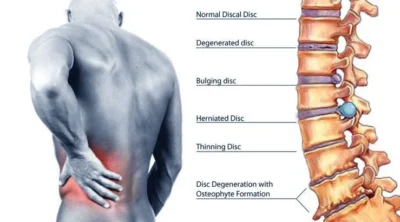Slip Disc Treatment in Jaipur
Dr. Arvind Jaga is a renowned physiotherapist specializing in Slip Disc Treatment in Jaipur. He is highly skilled in addressing herniated disc issues, a common condition where the soft cushioning between the spine’s vertebrae slips out of place, causing discomfort and nerve compression.
Dr. Jaga adopts a comprehensive approach to herniated disc treatment, customizing his plans to suit each patient’s unique needs. During the initial consultation, he conducts a thorough evaluation, including X-rays or MRI scans, to gain a detailed understanding of the condition.
His personalized treatment plan for slip disc issues may include the following components:
Pain Management: Dr. Jaga may prescribe medications to manage pain and inflammation associated with slip disc. Additionally, he employs techniques like heat or cold therapy to alleviate discomfort and reduce swelling.
Exercise and Stretching: With a focus on improving flexibility, strength, and range of motion, Dr. Jaga designs exercise and stretching routines. These may involve gentle stretches, low-impact aerobics, and targeted strengthening exercises.
Manual Therapy: Employing hands-on techniques such as massage, joint mobilization, or manipulation, Dr. Jaga aims to alleviate pain and enhance spinal mobility.
Posture Correction: Recognizing poor posture as a common contributor to slip disc issues, Dr. Jaga assists patients in correcting imbalances to reduce spinal pressure.
Education: Dr. Jaga believes in empowering patients with knowledge about their condition. He educates individuals on slip disc causes, symptoms, and preventive strategies to enable effective self-management.
Furthermore, Dr. Jaga may recommend complementary therapies like acupuncture, chiropractic care, or yoga to enhance the overall recovery process.
In conclusion, Dr. Arvind Jaga is an accomplished physiotherapist specializing in Slip Disc Treatment in Jaipur. His individualized approach to slip disc treatment ensures effective recovery and a life free from pain for his patients.
What are the symptoms of a slipped disc?
You can have a slipped disc in any part of your spine, from your neck to your lower back. The lower back is one of the more common areas for slipped discs. Your spinal column is an intricate network of nerves and blood vessels. A slipped disc can place extra pressure on the nerves and other structures around it.

Symptoms of a slipped disc include:
- pain and numbness, most commonly on one side of the body
- pain that extends to your upper or lower limbs
- pain that worsens at night or with certain movements
- pain that worsens after standing or sitting
- pain when walking short distances
- unexplained muscle weakness
- tingling, aching, or burning sensations in limbs
- loss or alteration in sensations
- Difficulty controlling bowel movements or bladder function
The types of pain can vary from person to person. See your doctor if your pain results in numbness or tingling that affects your ability to control your muscles.
The Two Most Common Causes For A Slipped Or Herniated Disc Are:
- Natural degeneration of the disc, which causes the nucleus pulposus to become less hydrated and weaken with age.
- Trauma / Injury to the disc, which may occur due to lifting a heavy load using incorrect posture or from external forces, such as, a whiplash injury. especially if accompanied by twisting or turning; and excessive strain forces associated with physical activities. Sudden forceful acute trauma is an uncommon cause of a slipped disc.
Rarely, It Might Be Difficult To Find A Particular Cause Of It.
The Importance Of A Correct Diagnosis
A doctor can accurately diagnose a slipped disc and rule out other causes of similar pain, such as tumors, fractures, or infection. A correct diagnosis also helps formulate an effective treatment plan to control your symptoms and prevent the progression of nerve or spinal cord damage.
When Should Someone Seek Medical Care for a Slipped Disc?
You should consult with your doctor for any neck or back pain significant enough to limit activity, any back pain that lasts more than a few days, or any neck or back pain associated with numbness or weakness, loss of bladder or bowel control, fever, or abdominal or chest pain. The doctor may suggest an urgent office evaluation or may advise you to go to the hospital’s emergency department.
